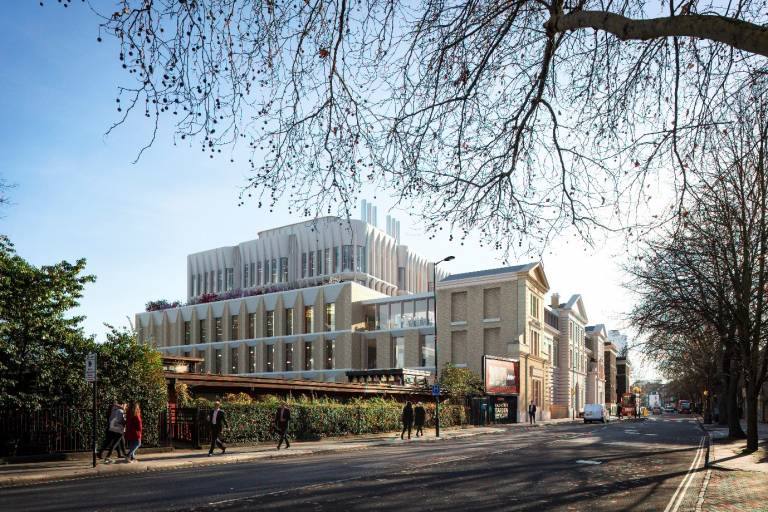New world-leading facility for UCL neuroscience gains planning approval
20 September 2019
UCL is delighted to announce that conditional planning permission* has been granted for a new £281.6m state-of-the-art facility, which will be home to UCL neuroscience.

The plans will transform the site at 256 Gray’s Inn Road, London, bringing together research scientists, clinicians and patients to create a world-leading hub for dementia and neurological disease research.
UCL is a global leader in pioneering research into neurological diseases such as Alzheimer’s disease, multiple sclerosis, Huntington’s disease, neuromuscular diseases, Parkinson’s disease, motor neurone disease, stroke and epilepsy. The new facility will create a collaborative, interdisciplinary environment to translate UCL’s research power into developing treatments for these conditions.
The site, which currently comprises the Eastman Dental Hospital**, the former Royal Free Hospital, the UCL Eastman Dental Clinic and the Levy Wing, is part of a major redevelopment project and will house over 500 neurological research scientists from UCL Queen Square Institute of Neurology and the UK Dementia Research Institute (UK DRI), along with the UK DRI national headquarters. The building will also house outpatient consulting and an MRI suite for the UCLH National Hospital for Neurology and Neurosurgery.
Professor Alan Thompson, Dean of Faculty of Brain Sciences and Garfield Weston Professor of Clinical Neurology and Neurorehabilitation, said: “We are delighted Camden Council has approved these plans, which will ensure this historic site remains at the heart of London’s cutting-edge health and science communities.
“This world-leading facility will transform our ability to tackle the devastating global health challenge of neurological diseases such as dementia, which is now the leading cause of death in England and Wales.
“By bringing the new building into UCL’s existing neuroscience community, we aim to create the most comprehensive, coordinated translational neuroscience research hub in the world.”
The new facility, part of the Transforming UCL programme, is due to be completed in 2024 and will offer benefits that extend beyond its four walls. Shared laboratory space, services and equipment will support collaboration across the whole of UCL’s neuroscience community, accelerating the discovery of new treatments. The focus on shared facilities will also encourage efficiency and sustainability. All of the building’s laboratories are designed to be reconfigurable so they can adapt to evolving research techniques and support future generations in developing breakthrough treatments.
Respect for the environment and local community are key principles underpinning the development. The new building will target BREEAM Excellent rating, aiming to reduce carbon emissions by 40% and produce low levels of waste going into landfill from the construction process. It will be open to the public with a café and exhibition spaces as well as thoroughfares for both walkers and cyclists. New landscaped areas will include a sensory garden, a courtyard and plenty of green space to create a calm environment for patients, visitors, workers and residents alike.
The new building will be funded from a combination of UCL, public and philanthropic sources.
Notes
* Camden Council granted planning permission, subject to a Section 106 Agreement, at a meeting on Thursday 19th September 2019.
**The Eastman Dental Hospital site will be vacated in late 2019.
Links
- UCL’s plans to redevelopment of 256 Gray's Inn Road
- UCL Brain Sciences
- UCL Queen Square Institute of Neurology
- UK Dementia Research Institute
Media contact
Henry Killworth
Tel: +44 (0) 0207 679 5296
 Close
Close

